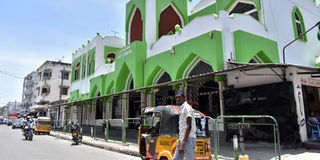Mombasa’s Majengo area gets new lease of life after Makaburi, Aboud Rogo

The Masjid Musa in Majengo, Mombasa County.
Ten years ago, one could not allude to terrorism in Kenya without referring to Mombasa’s Majengo estate.
Located in Mvita sub-county, Majengo had a notorious tag for radicalisation of youth and recruitment into the al-Shabaab terrorist group in Somalia in two of the area's mosques.
It is also here that two radical clerics who were later killed — Aboud Rogo and Abubakar Shariff alias Makaburi — preached, and had an almost cult-like following.
The controversial clerics were felled following their links with terror-related activities and their impact was demonstrated by the number of youths that flocked to their sermons at Musa and Sakina mosques — havens for disenfranchised and unemployed locals who found favour with the radical preachers.
After the killings of their leaders Sheikh Rogo and Makaburi, some of the youths took over the Masjid Musa and changed its name to Masjid Shuhadaa in honour of the two clerics.
The nearby Masjid Sakina was also frequented by the two controversial preachers.
The youths had a field day there until police officers raided the mosque and arrested some of them in 2014, while others fled and to date, are listed among the most wanted terrorists in the world.
They include Ramadhan Hamisi Kufungwa, Issa Abdalla Ahmed alias Issa Kauni, Ahmed Omar Said alias Dogo Tabibu, and Abdullahi Bulati alias Abdullahi Banati.
Recently, the Directorate of Criminal Investigations (DCI) declared them armed and dangerous as it appealed to the public to share any information about their whereabouts to aid their capture.
The mosque's management then reverted to its original name, Masjid Musa.
Fast forward to today and area residents are free to move around, visitors are welcomed in the neighbourhoods and business is booming again in Majengo.
According to Mombasa Acting County Commissioner Ronald Mwiwawi, the collaboration between human rights lobby groups, civil society organisations, religious leaders and security authorities has helped tame insecurity in Majengo.
“Previously the youths were not involved in making key decisions. However, recently they are involved in these discussions. When they are considered and given a chance to voice their issues, they see themselves as important people in the society,” says Mr Mwiwawi.
He adds peace seminars and workshops conducted by the civil society and human rights groups have also contributed by keeping the youths occupied.
“In those workshops, they are spoken to by their fellow youths who have become peace ambassadors and champions. In it, they are taken through the disadvantages of radicalisation. The chiefs and assistant chiefs employed are their fellow youths. This has helped a number of them open up and talk to government officials about their societal problems. The accessibility of such offices also eases the tension between residents and security officers,” says Mr Mwiwawi.
He pitches for more national and county government programmes citing an example of Kazi Mtaani, which he notes employed several youths and helped them keep away from drugs and crime.

Majengo Estate in Mombasa County.
Haki Africa’s Rapid Response Officer Mathias Shipeta praises the transformation of the area, noting it has also led to a decrease in the number of violent extremism cases.
“We were victims of the chaos that erupted in that area. I remember there were nights I would spend in mortuaries helping families locate their relatives. We were victimised as part of radicalisation groups to the extent our accounts were frozen. To be here today to witness a new face of Majengo is not a small issue,” says Mr Shipeta.
Business skills training for the youths of Mombasa was provided, where on completion they received start-up capital.
Other initiatives they have taken part in ensuring safety is prioritised in the area, he says, is community engagements through public barazas.
“Those who came back, the al-Shabaab returnees, were traced and killed. This instilled fear among the youths and they started to keep away from criminal activities. They were afraid that they would be next. The problem was many who were radicalised were brainwashed and wanted to earn easy money, but once they flee and come back, the others learn from it,” says Mr Shipeta.
Religious leaders are calling on the government to involve youths more in employment opportunities.
“The government should keep in mind that when a development project is taking place in the coastal region, 70 per cent of employees should be youths within that area. This will help tame insecurity cases,” says the National Chairman of the Kenyan Muslims Advisory Council (Kemnac), Sheikh Juma Ngao.
Sheikh Abu Qatada notes that talk shows and Friday mosque sermons on the significance of peaceful co-existence have helped some youths keep away from criminal activities.
“The youths need to be kept busy, an idle person can be influenced into drug addiction and crime easily, compared to those who are employed and busy,” says Sheikh Qatada.
When Nation visited the Majengo area, residents were going about their businesses, with the majority appreciating security officers for restoring peace in the area.
“A day like Friday 10 years ago was not normal to us. Children were picked up early from school and everyone will be indoors by noon. Others had to move out of Majengo to protect their families. However, today, we are glad since we can sell our goods until midnight,” says Mr Salim Riaka, a trader.
Before that, it was hard for any outsider to be allowed to conduct business in the area, he says.
Ms Zulfa Buoga, a Mvita coordinator, says through the County Senators office, the youths are enroled in different empowerment programmes.
“Cases of parents complaining that their relatives have gone missing or killed by security officers have reduced. This is because of such programmes that they are enroled in,” says Ms Buoga.
Ms Fadhila Said calls for the government to come up with programmes that will support the youths to travel overseas in search of greener pastures.




